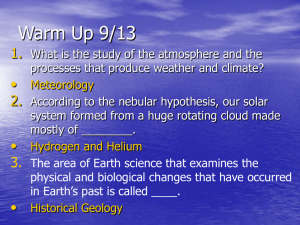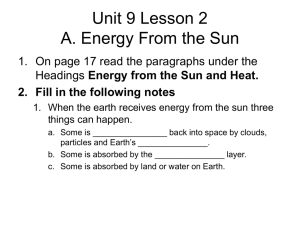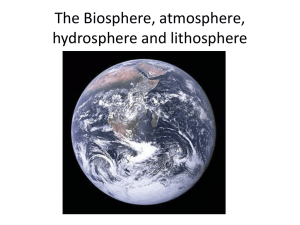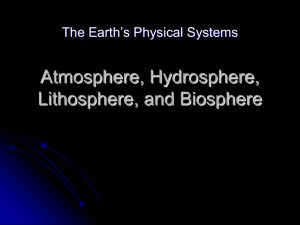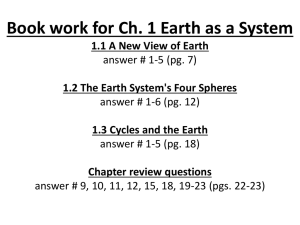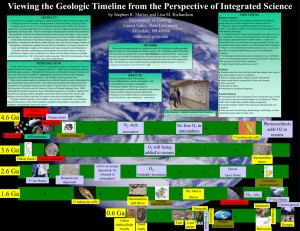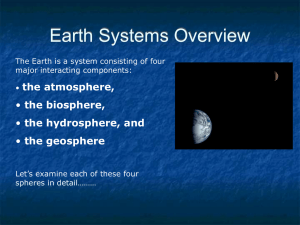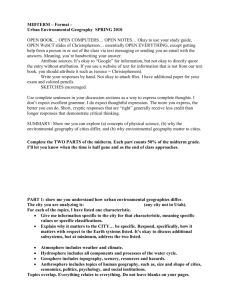Chapter 3- The Dynamic Earth
advertisement
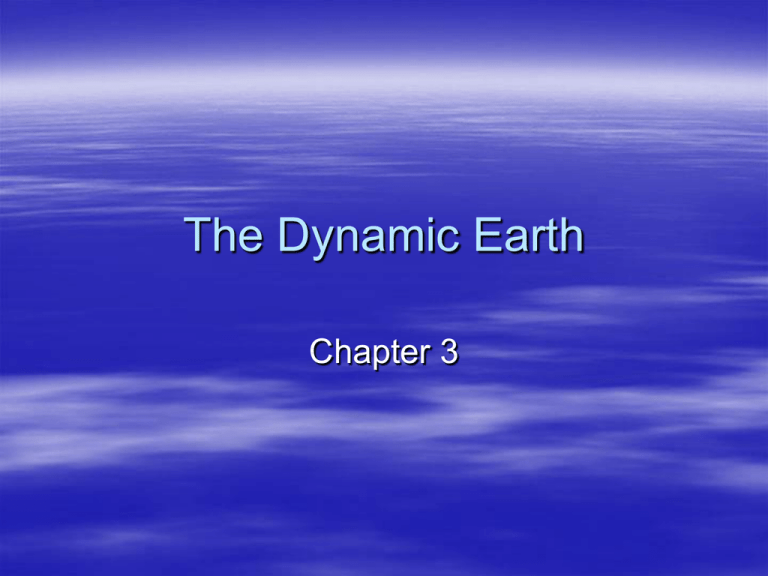
The Dynamic Earth Chapter 3 The Geosphere Geosphere- the solid part of the earth – Rock – Soil – Sediment The Geosphere Studying the earth’s interior – Deepest well (12 km) – Seismic waves The Geosphere The Composition of the Earth – Crust – Mantle – Core The Geosphere Structure of the Earth – Lithosphere – Athenoshere – Mesosphere – Outer Core – Inner Core The Geosphere Plate Tectonics- rigid layer of the lithosphere is divided into pieces called plates that glide over the underlying athenosphere. – Most geologic activity occurs where these plates meet called plate boundaries. – Colliding plates build mountains. Plate Tectonics Interior of the Earth and Plate Tectonics The Geosphere Earthquakes – Occur along faults (breaks in the earths plates at plate boundaries) – Measured using the Richter Scale- each whole # increase equals about 31 times more power. 2.0- Smallest that can be felt 9.5- largest ever recorded Earthquakes The Geosphere The Geosphere Volcanoes- mountain built from magma – Local effects- lava and ash flows down the mountain can destroy the local area – Global effects- ash in the atmosphere can cause global climate change Volcanoes The Geosphere Erosion- the removal and transport of surface material – Water erosion – Wind erosion Erosion The Atmosphere Composition – Nitrogen- 78% – Oxygen- 21% – Other- 1% The Atmosphere Air pressure – More dense near the earth – Almost all of the earth’s atmosphere is located within 30km of the earth’s surface The Atmosphere Layers of the atmosphere The Atmosphere Troposphere – Up to 18 km high – Weather occurs here – Densest layer of the atmosphere – Temperature decreases with altitude The Atmosphere Stratosphere – From 18 – 50 km high – Temperature increases as altitude increases – Ozone layer- filters out UV radiation entering the earth’s atmosphere. The atmosphere Mesosphere – From 50 – 80 km – Coldest layers of the atmosphere (-93 C) The Atmosphere Thermosphere – From 80 – 550 km high – Hottest layer of the atmosphere (2000 C) – Absorbs x-rays and gamma rays that enter the earth’s atmosphere. – Ionosphere- layer of ions found in the lower thermosphere. The Atmosphere Energy in the atmosphere – Radiation-transfer of energy across a space. – Conduction- heat flow from a warmer object to a cooler object – Convection- transfer of heat by air currents The Atmosphere The Atmosphere The Greenhouse effect – Process of gasses trapping heat energy Water vapor Carbon Dioxide Methane Nitrous oxide The Hydrosphere The hydrosphere includes all water on or near the earth The Hydrosphere The Hydrosphere The Hydrosphere Oceans Oceans The Hydrosphere – Salinity- the concentrations of all the dissolved salts in ocean water. The Hydrosphere Oceans – Temperature zones The Hydrosphere Oceans– The global temperature regulator- The ocean absorbs energy from the sun and stores this energy. This ability to absorb and store energy regulates the global atmospheric temperature. Oceans- The Hydrosphere – Currents- surface currents are wind driven and are considered warm-water or cols-water currents. The Hydrosphere Freshwater – Around 3% of the earths water is freshwater. – Most of the freshwater is locked in icecaps and glaciers. River systems – A network of streams that drains an area of land. The Hydrosphere Groundwater – When water reaches the land as precipitation it either runs off into a stream or soaks into the ground. – Most water enters the ground – Aquifer- a layer of rock that stores ground water. Recharge zone- surface of the land where water enters the aquifer The Hydrosphere The Biosphere Biosphere- the narrow layer around the earth where all life is found – 11 km below the surface of the ocean to 9 km up into the atmosphere. The Biosphere Requirements for life– Liquid water – Temperature- between 10 C and 40 C – Components of life are continually recycled – Gravity to hold the atmosphere – Energy from the sun The Biosphere Energy is constantly added to the earth, causing it to be an open system. Matter is not added to the earth causing it to be a closed system. The Biosphere
